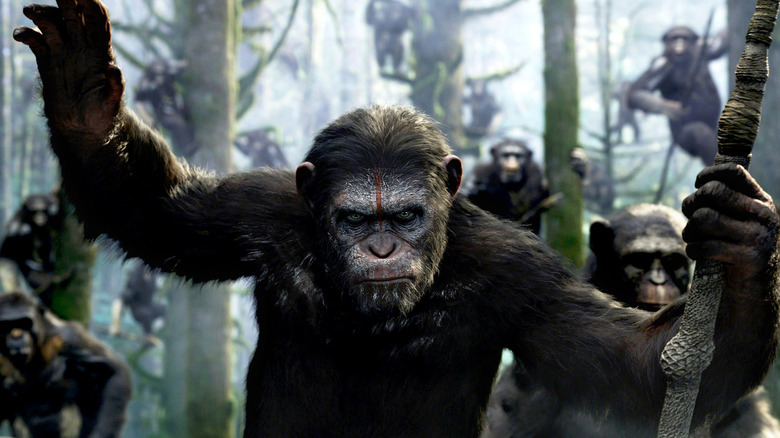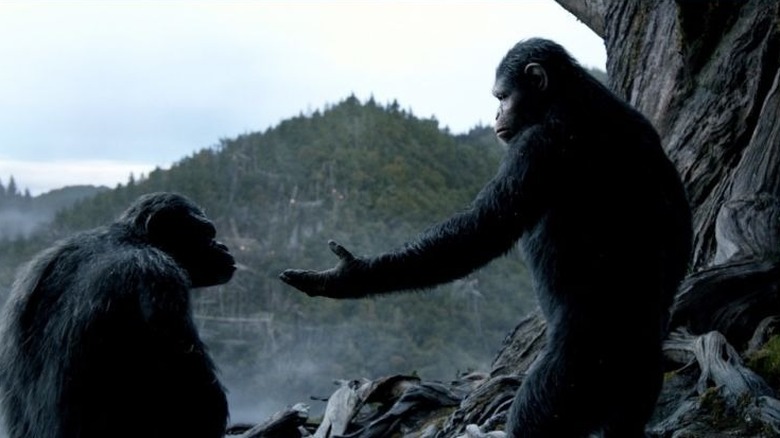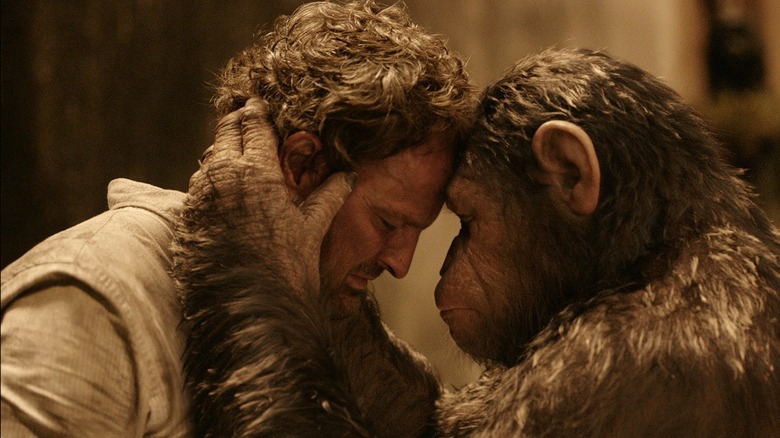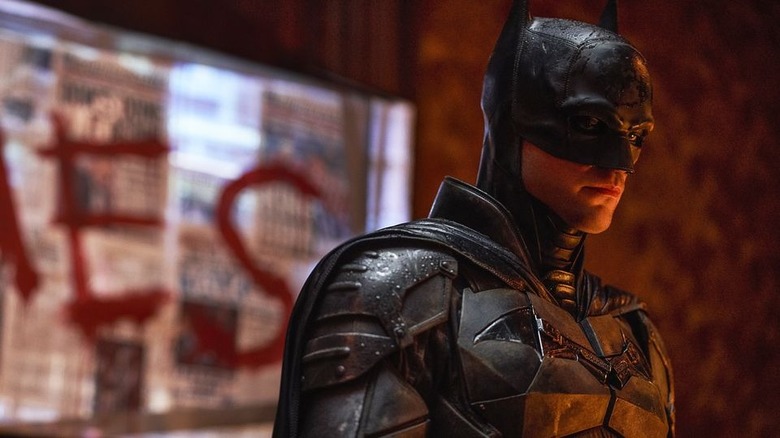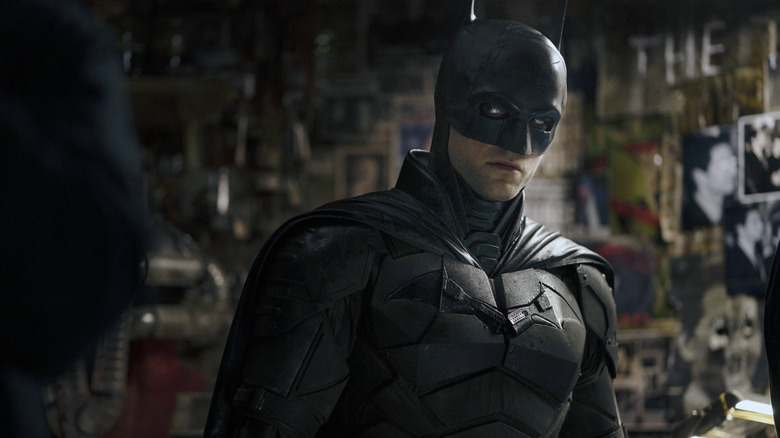How Matt Reeves Muscled His Way Into Planet Of The Apes
The "Planet of the Apes" franchise that began with "Rise of the Planet of the Apes" could easily be considered one of the few modern sci-fi trilogies that only got better with each installment. The story of Caesar (Andy Serkis) and his rise to the status of a mythic leader is one of epic proportions. Moreover, the "Apes" trilogy never let its massive scale get the better of it, and instead, the franchise used the backdrop of the changing hierarchy of the world to tell an intimate story about Caesar and what it means to be a leader. If you're looking for someone to thank for getting you emotionally invested in a shotgun-wielding ape, look no further than director Matt Reeves, whose recent work on "The Batman" only continues to show his character work is second to none.
Reeves was responsible for two-thirds of the trilogy, directing the final two installments "Dawn of the Planet of the Apes" and "War for the Planet of the Apes." We can thank Rupert Wyatt for his contributions and kicking things off with "Rise of the Planet of the Apes," but the topic of the discussion is strictly on Reeves. His work on the second film paved the way for "War" and what would ultimately be considered the two superior installments in the trilogy. Matt Reeves joined in late on the process of getting "Dawn" off the ground, but that wasn't going to stop the director from seriously taking the reins.
Starting from scratch
Going into "Dawn," Matt Reeves met with producers Dylan Clark and Peter Chernin. The filmmaker spoke to Vanity Fair about boarding the project, specifically when he "suggested throwing out the screenplay entirely," because the apes were more advanced than where they were in "Rise." Reeves' ambition to tell his own story came from the potential he saw in picking up where "Rise" left off:
"The premise presented itself very strongly, very quickly to me. What I love about 'Rise' is how emotional it was, and I said, 'I think there's a way to do something really emotional here.'"
"Dawn" picks up ten years after "Rise," with Caesar and his ape colony living in isolation in the Muir Woods. While not technologically advanced, Caesar and his apes are sophisticated enough to build huts, teach their young, and create basic weapons and tools. More importantly, the establishment of this period allowed Reeves to craft a story about Caesar's leadership and rise to the occasion in a tumultuous time for his kind. A much more advanced ape civilization would ill-suit the story of Caesar we see in "Dawn."
The burgeoning society in "Dawn" challenges Caesar as a character, with Koba (Toby Kebbell) in particular causing trouble with a coup that pins an attempt on Caesar's life on a struggling human colony. The film paints a powerful picture of the struggles of a good leader, with Caesar learning the hard way that apes can, sometimes, be just as bad as humans.
Finding characters in the spectacle
Looking at Reeve's work before "Dawn," there's a clear pattern of focusing on relationships between two characters. "Cloverfield" and "Let Me In" both have essential pairings that are the film's driving force within a high concept scenario. "Cloverfield" has a found footage trek through New York, as it's being destroyed by a Kaiju, that's driven by one man's love for a woman and his need to make sure she's safe. "Let Me In" revolves around a troubled youth forming an unlikely bond with a centuries-old vampire who looks like a young girl. Both films also keep those fantastical concepts grounded with genuine relationships.
Reeves crafted "Dawn" around Caesar and human survivor Malcolm (Jason Clarke). Considered two sides of the same coin, Caesar and Malcolm both represent the best of what their species can be. The two characters rely upon one another throughout the film, becoming an emotional crux that ends the movie on a powerful note. Malcolm slowly steps into the shadows while Caesar rises to the occasion as a leader for the apes at their most turbulent times. Reeves' bold franchise takeover inevitably led to "War," where we really got to see the director let loose.
"War for the Planet of the Apes" saw Matt Reeves carry over his sense of ambition with "Dawn" to an even bigger scale, if you can believe it. Part war film, part western, and part biblical epic, "War" has Reeves at his most confident, and Caesar at his most vulnerable and angry. On a heart-of-darkness-like journey to kill the enigmatic Colonel (Woody Harrelson), Caesar becomes the leader he was always meant to be and ends the trilogy on a spectacularly high note.
Staying true to a vision
"War" solidified Reeves as a director any big franchise should trust, which is likely why he got handed the keys to what is undoubtedly DC's most famous (and profitable) hero: Batman. And wouldn't you know it, when it comes to development on "The Batman," we find Reeves at a similar crossroads: A script was already written by Ben Affleck (who was still Batman at the time), and the project had been in development for quite a while. Reeves, at this point, had already been hard at work completing his "Planet of the Apes" trilogy, putting finishing touches on "War." With one trilogy nearly done, maybe it was time for Reeves to start another.
Speaking to Esquire, Reeves detailed his approach to the project. To no one's surprise, the director's passion for character and his brand of personal storytelling would have him making similar suggestions he made before joining "Dawn." Reeves recalled:
"I said look, I think maybe I'm not the person for this. And I explained to them why I love this character. I told them that there have been so many great movies, but if I were to do this, I'd have to make it personal, so that I understood what I was going to do with it, so that I know where to put the camera, so that I know what to tell the actors, so that I know what the story should be. This take, I told them, pointing at the script, is a totally valid and exciting take. It is almost James Bond-ian, but it wasn't something that I quite related to,"
Ending a trilogy and starting a new one
Reeves' respect for himself and the character of Batman would eventually lead to WB starting from scratch, with the "Apes" director at the helm. The rest is very-recent movie history, as "The Batman" became critically and financially successful (with a sequel announced), thanks to Matt Reeves' singular vision. Reeves is an incredibly talented filmmaker. His vision for franchises helps to ground the blockbuster spectacle with real emotion and intimacy. I'm personally glad that Reeves muscled his way into the "Apes" trilogy. Without it, we'd be short an incredible sci-fi trilogy and a fresh new take on Batman.
